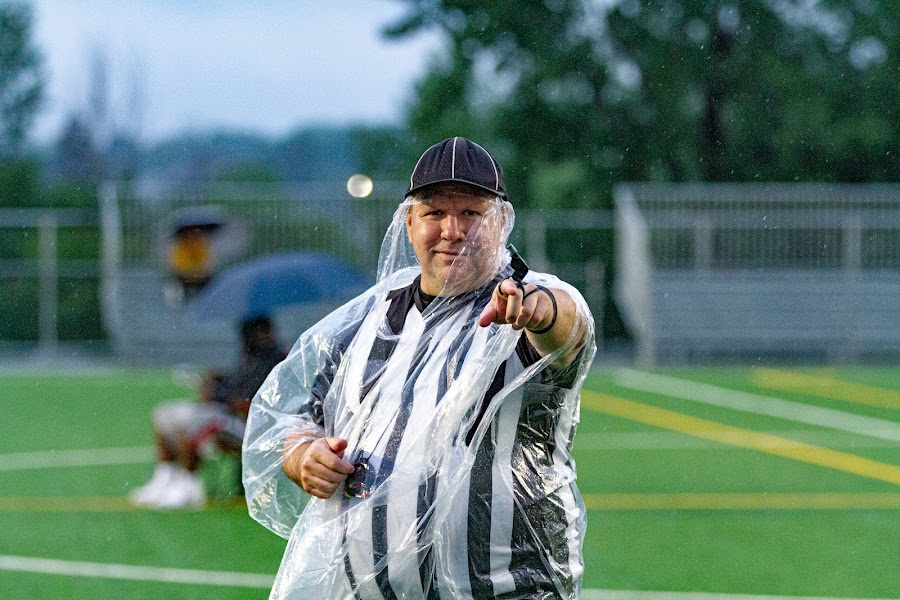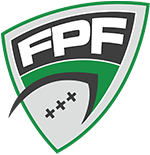FlagPlus Interview Series Part 2: Leo Gervais

In part two of the FlagPlus Football Interview Series, I had a chance to talk to someone who is always up to tell a story and discuss football, preferably over a cold beer. He is also an educator, journalist, a mentor to many, a member of the Greenfield Park Packers Hall-of-Fame, the Canadian Football League’s (CFL) official Scorekeeper for the Montreal Alouettes, an RSEQ official, one of the faces of FPF, and someone I call a friend, FPF Head Referee-in-Chief and Assignor, Leo Gervais.
Q: You have been a referee since 1998 at various levels of football. What made you choose that path?
A: “Honestly, I never had any intention of being a referee. After I finished playing football and coaching, my friend for over 25 years Ron Romanado, who to this day is still one of the Referee Assigners in Montreal, he along with another friend, the late Bill Rowden, they convinced me to be a referee for tackle football.”
Q: You played Bantam and Midget football for the Greenfield Park Packers, Junior Football with the Chateauguay Raiders and South Shore Cobras. In CEGEP you suited up for Lennoxville Cougars, and then went on to play university ball for the Concordia Stingers. You played the game for a long time. What are some of the similarities between being a player and ref?
A: “There are a lot of similarities between the two. As a player you have 11 other teammates on the field who are working with you towards one purpose. As a referee, you have six to seven teammates that you work with towards a goal as well. Both as a ref and a player, you must show up, support your teammates, and do your job because your team is relying on you. There’s also the camaraderie that exists in both areas. You work together, travel together, and develop friendships that will last a lifetime.”
Q: How hard was it for you to turn the switch off as a player, and focus on just being an official?
A: “Turning the player switch off felt weird at first. The transition took a few years. As a player I played Running Back and Linebacker, so I was always directly in the action.” Even today when I get my evaluation, I always get told that I need to step back several feet because I am too close to the action.”
How did you get involved in FPF?
A: “My friend Sol Gliksman, who is referee, worked the first year in 2005. He told me it was a good league and asked me if I wanted to take part.”
Q: In all your years in FPF, out of all the big games, plays, and highlights that you have seen, what one moment stands out to you the most?
A: “I would have to say it was when Kevin Wyeth (FPF’s career touchdown passes leader) threw his 1000th touchdown pass. He and the rest of his team Montreal’s Finest, all signed the ball and gave it to me. That was a huge sign of respect, and appreciation for the not just the work that I do, but for all the officials. I really appreciated that.”
Q: Being a ref is not an easy job. There are a lot of variables you need to be aware of in both tackle and flag. What in your opinion makes a good referee?
A: “First and foremost, you must know the rules. Things happen so quickly, some players will try to push the limit, while others simply don’t know the rules, so you have to know what’s going on. If you don’t it will show. You must know the mechanics of the game. What I mean by that is where to position yourself on certain plays. The final thing you must master is human relations. Not all players and coaches are the same. You must know your clientele. Know where to lean on and off.”
Q: Is it necessary to have played football to be a referee?
A: “No. Some of the refs we have in FPF never played or worked football games before. In FPF, we have some that have come from other sports like handball, basketball, hockey, and badminton. There are transferable skills from other sports that apply to the game. I will say though, it is easier to do the job if you have played or coached before, because you understand the flow and emotions of the game more than someone who has never been involved.”
A: Q: You have worked in touch football, and other flag football leagues as well. What Makes FPF so unique?
Q: “Players like the league because of the competition. We have some of the best players in the country. They play with and against each other. The competition gets better every year. You don’t always see that in other leagues. The detail in FPF is also incredible. The stats, podcasts, articles, everything is there, and it is made accessible. The referee support, FPF Jr, Women’s, Co-Ed, when I first started there were less than 30 teams in total. Look at how it has grown. The league has a culture and vision and is always looking for ways to improve.”
Q: Over the last decade or so, there has been a change in the landscape where we have been seeing more females getting involved in the game. How refreshing is that for you, and what do you think is the biggest factor behind it?
A: “I think that it is great, and it speaks to the popularity of lady’s flag football. A big part of that is the RSEQ, which has put money into the game, and has helped pick things up where touch football has dropped off the last few years. There are flag football teams in elementary, high school, colleges, and universities. It gives females a chance to play and provides a feeder system for national teams, and hopefully down the road with the Olympics. At the end of the day, flag football is simple. Get a ball, get a belt, and find a field.”
Q: With two Women’s divisions, three Co-Ed division, and female refs, FPF is no stranger to that diversity.
A: “The league gives ladies a legit and competitive place to play. Every year we see more and more females getting involved in our league. Physically, most of the ladies are not as strong as the guys, but that is the only difference. The women are just as skilled, and they pick up the game and rules quickly, quicker than the men.” Right now, female participation and interest in flag football is just hitting its stride. It is going to take off as we move forward, which is a great thing.”
Q: You are a mentor to many in the league, including Tara Mrakic. She is a trailblazer when it comes to women’s flag football as a player, ref, and Head Coach of the Vanier Cheetahs. You brought her into FPF. What stood out to you about her?
A: :Tara is one of the top officials we have in FPF. I remember seeing her as a touch football referee, and I could see right away that she had the “it” factor. She is smart, hard-working, and dedicated. She has worked numerous Division 1 games and championship games. The stage is never too big for her. She’s earned the respect that she has and doesn’t back down from anyone. Tara is helping educate the next wave of flag football players in the province with all the work she is doing at Vanier, and here in FPF with our refs. You look at Lamees Aljoundi. She played under Tara at Vanier and is currently both a player and ref in our league. She is another good official who is constantly improving and climbing the ranks in our league and is also teaching the game to other females.”
Q: As a ref, is there a moto that you live by, or something you always try to teach other officials?
A: “Always friendly, never your friend when dealing with players. The guys and girls wearing the stripes are your only friends on the field, so stick together.”
Q: Sometimes players cross the line verbally. What line does a player have to cross for you to throw a flag?
A: “All I ask for is basic politeness. I have thick skin, and I know football can be a emotional game, but when a player gets personal and tries to insult me when arguing a call, that will result in a flag. We can’t flag everything all the time, and I am the first to admit we are not perfect, but if you get stupid out there, I will correct stupid.”
Q: You are a die-hard Detroit Lions and Notre Dame Fighting Irish fan. How did you fall in love with football, and who was your favorite player growing up?
A: “When I was a kid, my father and I used to watch Dallas Cowboys games on TV. That was his favorite team. In 1979 I was riding my bike past Greenfield Park Arena, and I saw some guys playing football on the field. As a kid I spent a lot of time around boxing rings, and I always viewed boxers as gladiators. When I saw the football guys, they looked like a field of gladiators. The hitting and tackling resembled 12 guys fighting each other everyday. I was hooked right away. I like the Lions because in 1980 I went to a football camp called Offense Defense Football Camp. One of the counselors and guest speakers was Running Back Billy Sims, 1978 Heisman Trophy winning Running Back from the Oklahoma Sooners. He was a nice guy. For Notre Dame, I always liked the tradition and pageantry associated with the program. They had the greatest Quarterback ever to play the game in Joe Montana playing for them, and Rocky Bleier, who is my favorite player of all-time. I am also part Irish and Catholic, so that doesn’t hurt.”
A: Over the course of your career, you have officiated more than four thousand games. What makes the game exciting for you?
Q: “I still get to participate in live time. Everything unfolds in front of you. Big plays are still exciting and fun for me. You never know what’s going to happen next, and getting a chance to see great athletes make cool plays is always a treat.”
Q: When you aren’t on the field, what do you do in your spare time?
A: “I like to ski, but when I am not doing that, I am usually at one of Phoebe’s (his daughter) sporting events. She does track and field and is currently trying out for the Team Quebec for flag football team. She’s a great athlete, and she is starting to learn how to be an athlete, and that it takes more than just physical skills. She is in the top 10 in both the 100- and 200-Metre-long jump. She’s only 15, but she is elite for her age. I am proud of her!”
Q: What words of wisdom would you give to any future refs out there that are reading this?
A: “You are a steward of the game. Show up on time and be prepared. Bring your A-game every time you step on the field. Adjust your calls to the level of the game. When you are working a kid’s game, teaching them where and how to line up might be the most important thing you do. Always ask questions, and don’t be afraid of change. Embrace it. Be a student of the game. Make it more than just about the money. Learn from other people’s mistakes and your own as well because that’s how you improve. Finally, no one is there to watch refs throw a flag. Don’t make the game about you.”


